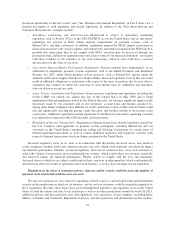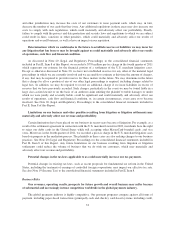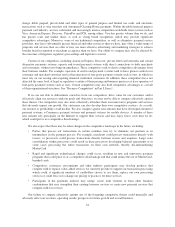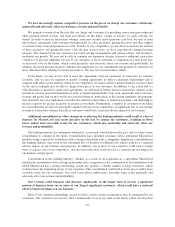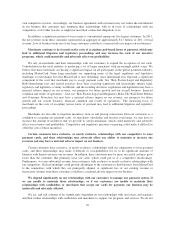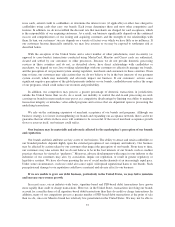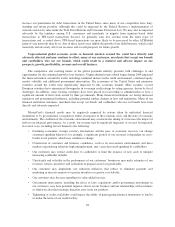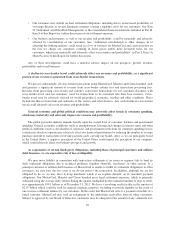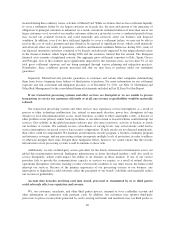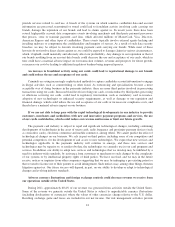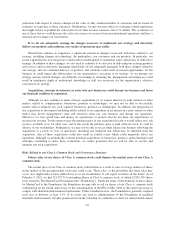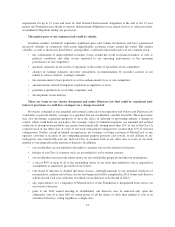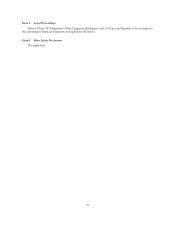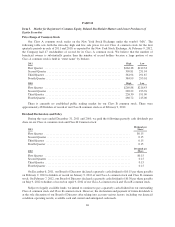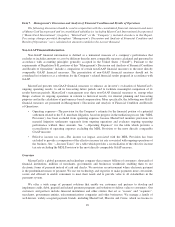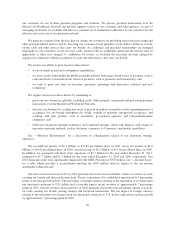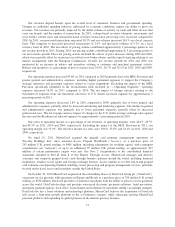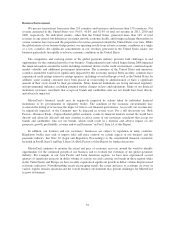MasterCard 2011 Annual Report Download - page 46
Download and view the complete annual report
Please find page 46 of the 2011 MasterCard annual report below. You can navigate through the pages in the report by either clicking on the pages listed below, or by using the keyword search tool below to find specific information within the annual report.protection with respect to adverse changes in the value of only a limited number of currencies and are based on
estimates of exposures to these currencies. Furthermore, we may become subject to exchange control regulations
that might restrict or prohibit the conversion of our other revenue currencies into U.S. dollars. The occurrence of
any of these factors could decrease the value of revenues we receive from our international operations and have a
material adverse impact on our business.
If we do not adequately manage the changes necessary to implement our strategy and effectively
deliver our products and solutions, our results of operations may suffer.
MasterCard continues to experience a significant amount of changes associated with items related to our
strategy, including changes in technology, the marketplace, our customers and our products. In particular, our
recent expansion into new businesses could result in unanticipated or unfamiliar issues which may be difficult to
manage. In addition to these changes, we also need to continue to be effective in delivering our existing products
and services and in effectively managing related risks. If not adequately managed, both these changes related to
our strategy and our continued delivery of products and solutions could result in missed opportunities for the
business or could impact the effectiveness of our organization’s execution of its strategy. As we manage our
strategy and any related changes, any difficulty in retaining or attracting key management and employees could
result in inadequate depth of institutional knowledge or skill sets necessary for the organization’s effective
execution of its strategy.
Acquisitions, strategic investments or entry into new businesses could disrupt our business and harm
our financial condition or reputation.
Although we may continue to make strategic acquisitions of, or acquire interests in joint ventures or other
entities related to, complementary businesses, products or technologies, we may not be able to successfully
partner with or integrate any such acquired businesses, products or technologies. In addition, the integration of
any acquisition or investment (including efforts related to an acquisition of an interest in a joint venture or other
entity) may divert management’s time and resources from our core business and disrupt our operations.
Moreover, we may spend time and money on acquisitions or projects that do not meet our expectations or
increase our revenue. To the extent we pay the purchase price of any acquisition in cash, it would reduce our cash
reserves available to us for other uses, and to the extent the purchase price is paid with our stock, it could be
dilutive to our stockholders. Furthermore, we may not be able to successfully finance the business following the
acquisition as a result of costs of operations, including any litigation risk which may be inherited from the
acquisition. Any of these acquisitions could also result in control issues which could negatively affect our
reputation. Although we periodically evaluate potential acquisitions of businesses, products and technologies and
anticipate continuing to make these evaluations, we cannot guarantee that we will be able to execute and
integrate any such acquisitions.
Risks Related to our Class A Common Stock and Governance Structure
Future sales of our shares of Class A common stock could depress the market price of our Class A
common stock.
The market price of our Class A common stock could decline as a result of sales of a large number of shares
in the market or the perception that such sales could occur. These sales, or the possibility that these sales may
occur, also might make it more difficult for us or our stockholders to sell equity securities in the future. As of
February 9, 2012, we had 121,335,751 outstanding shares of Class A common stock, of which 12,819,395 shares
were owned by The MasterCard Foundation (the “Foundation”). Under the terms of the donation of these shares
by MasterCard to the Foundation, the Foundation became able to sell its shares of our Class A common stock
commencing on the fourth anniversary of the consummation of the IPO in May 2006 to the extent necessary to
comply with charitable disbursement requirements. Under Canadian tax law, the Foundation is generally required
each year to disburse at least 3.5% of its assets not used in administration of the Foundation in qualified
charitable disbursements. Despite permission from the Canadian tax authorities to defer its annual disbursement
42


